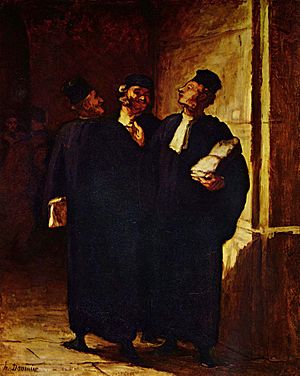Cognitive dissonance facts for kids
In psychology, cognitive dissonance is the uncomfortable feeling (like stress) you get when you have two or more ideas, beliefs, or values that don't match up. This feeling can happen when you do something that goes against what you believe is right, or when you learn new information that challenges your existing beliefs.
A famous psychologist named Leon Festinger suggested that people naturally try to keep their thoughts and beliefs consistent. When our thoughts are out of sync, it makes us feel uneasy. Because of this, we are motivated to reduce that uncomfortable feeling of cognitive dissonance.
The Fox and the Grapes: A Classic Example
The old story of "The Fox and the Grapes" by Aesop is a great example of cognitive dissonance. In the story, a fox sees some delicious-looking grapes hanging high up. He really wants to eat them. But no matter how hard he tries, he can't reach them.
After failing to get the grapes, the fox decides they weren't worth eating anyway. He tells himself that the grapes were probably sour because they weren't ripe.
The lesson from this fable is that sometimes, when we can't get something we want, we pretend we didn't want it in the first place. This is where the phrase "sour grapes" comes from! The fox changed his opinion about the grapes to feel better about not being able to reach them. This helped him reduce his uncomfortable feeling (cognitive dissonance) about not getting what he desired.
Images for kids
See also
 In Spanish: Disonancia cognitiva para niños
In Spanish: Disonancia cognitiva para niños
 | James B. Knighten |
 | Azellia White |
 | Willa Brown |






